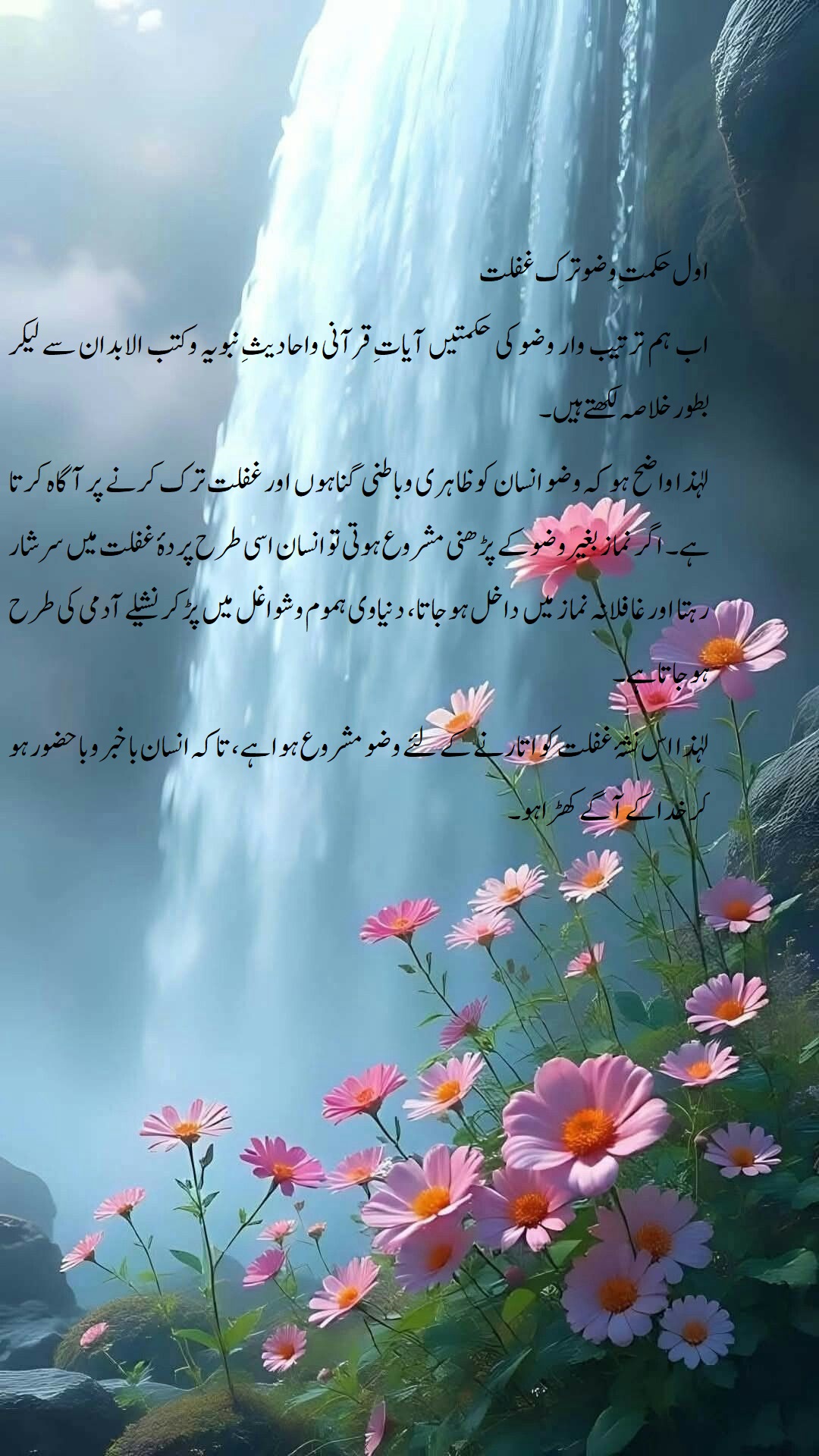Wudhu and Combatting Negligence
Last updated on October 22nd, 2025 at 09:04 am
Reading Time: 3 minutesHereunder appears an extract from Hakeemul Ummat Mujaddidul Millat Moulana Ashraf Ali Thanwi’s (Rahmatullahi alaih) Al-Masaalihul Aqliyyah Lil Ahkaamin Naqliyyah, in which Hazrat Thanwi elucidates one wisdom in the ritual act of Wudhu.
Translation and Explanation of the Text
Title: The First Wisdom of Wudhu (Ablution) is the Abandonment of Negligence (Ghaflat)
Text:
“Now, we are writing in sequence, in a summarized form, the wisdoms of wudhu derived from the Verses of the Qur’aan, the Prophetic traditions, and books of physiology.
It is clear that Wudhu makes a person aware of abandoning outward and inward sins and negligence. If Salaah was prescribed without Wudhu, a person would have remained absorbed in the veil of negligence and would have entered Salaah in a state of heedlessness. He would have become engrossed in worldly worries and distractions, like an intoxicated person.
Therefore, to remove this intoxication of negligence, Wudhu has been prescribed, so that a person may stand before Allah with awareness and presence of heart.”
Detailed Explanation of Maulana Ashraf Ali Thanwi’s (Rahmatullahi alayh) text
Hazrat Moulana Ashraf Ali Saheb Thanwi’s insights have a unique way of connecting the external Acts of Worship (Ibadah) to our internal spiritual state (Ihsaan), reminding us that the Shariah is not just a set of rules, but a Divine Cure for the ailments of the heart.
- The Core Wisdom: Combating Ghaflat (Negligence)
The primary wisdom Hazrat Thanwi highlights for the legislation of Wudhu is the removal of غفلت (Ghaflat). In Islamic spirituality, Ghaflat is a state of heedlessness, forgetfulness of Allah, and being absorbed in the transient world to the point of neglecting spiritual reality. It is the opposite of ذکر (Thikr), the Remembrance of Allah.
- Wudhu as a Spiritual Awakening:
Wudhu is not merely a physical act of washing limbs. It is a process of awakening. The sensation of cool water on the skin, the specific, deliberate actions, and the accompanying prayers (Du’as) are all designed to snap a person out of his/her spiritual slumber. It serves as a tangible signal that one is about to transition from mundane activities to the sacred act of Communication with Allah.
- The Analogy of the “Intoxicated Person”:
Hazrat Thanwi (Rahmatullahi alaih) uses a powerful analogy: a person engrossed in worldly worries is like a نشیلے آدمی (Nasheeyle Aadmi) – someone who is intoxicated or in a stupor. Such a person is unaware, confused, and disconnected from reality. Similarly, without Wudhu, a person would approach Salaah in this state of spiritual “intoxication,” mechanically going through the motions without his heart being present.
- The Objective: Presence Before Allah (حضور / Hudhoor):
The ultimate goal of this process is to achieve حضور (Hudhoor), or presence of heart. When a Muslim stands for Namaaz (Salaah), he/she is standing directly before Allah. This is the most profound moment of a Believer’s day. To do so while negligent would be a form of spiritual disrespect. Wudhu is the key that unlocks the door to this state of “با خبر و باحضور (Baa Khabar wa Baa Hudhoor)” – being alert, aware, and wholly present before the Divine.
Summary in Simple Terms:
Allah Ta’ala has made Wudhu a compulsory first step for Salaah. One of its deepest wisdoms is to wake us up spiritually. We get so busy and distracted by the world that we forget Allah Ta’ala. Wudhu, with its specific routine of washing, acts like a splash of cold water on our soul. It shakes us out of that daydreaming state and says, “Pay attention! You are about to talk to your Lord.” Without this, we might perform our Salaah like a sleepy or drunk person—just moving our body without our hearts being in it. So, Wudhu was prescribed to ensure that when we stand before Allah, we are fully awake, aware, and respectful with our hearts and minds focused entirely on Him.
May Allah Ta’ala grant us the ability to understand the profound wisdoms of His Shariah and to perform our Acts of Worship with presence of heart. Aameen.
(Khairun Nisa)

